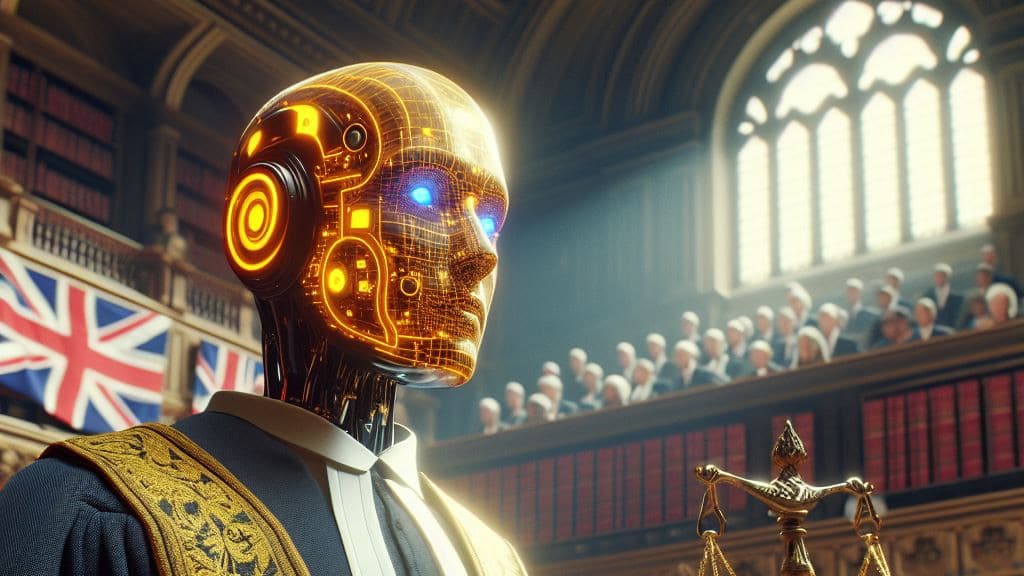UK Supreme Court Rejects Computer Scientist Thaler’s Plea to Patent AI as an ‘Inventor’


In Brief
The UK Supreme Court rejected computer scientist Stephen Thaler’s plea for AI to be recognized as the rightful owner of patents.

In a legal battle in the United Kingdom, a U.S. computer scientist, Stephen Thaler, faced a setback on Wednesday as he sought to secure patent rights for inventions attributed to his artificial intelligence (AI) system.
The case centered around the question of whether artificial intelligence can be recognized as the rightful owner of patents. Thaler, the proponent of two patents generated by his AI system named Device for Autonomous Bootstrapping of Unified Sentience (DABUS), encountered a rejection from Britain’s Intellectual Property Office.
The refusal was grounded in the contention that patent rights could only be conferred upon a human or a corporate entity, excluding machines. Thaler pursued an appeal to the UK’s Supreme Court, which ultimately unanimously dismissed his plea.
The court held that, according to current UK patent law, an inventor “must be a natural person”.
“This appeal is not concerned with the broader question whether technical advances generated by machines acting autonomously and powered by AI should be patentable,” said David Kitchin, Judge in the court’s written ruling, as reported by Reuters.
“Nor is it concerned with the question whether the meaning of the term ‘inventor’ ought to be expanded … to include machines powered by AI which generate new and non-obvious products and processes which may be thought to offer benefits over products and processes which are already known,” Kitchin added.
Thaler’s legal representatives issued a statement, asserting that the judgment highlighted the inadequacy of current UK patent law in safeguarding autonomously generated AI inventions.
This legal setback in the UK mirrors a previous disappointment for Thaler in the United States, where the Supreme Court opted not to hear a challenge to the U.S. Patent and Trademark Office’s refusal to grant patents for inventions originating from his AI system.
Thaler’s Long Fight to List AI as a Patent Inventor
Back in 2021, the Companies and Intellectual Property Commission of South Africa officially awarded a patent to a food container designed using fractal geometry by DABUS – an artificial intelligence system.
The patent application, submitted under the Patent Cooperation Treaty on September 17, 2019, marked a distinctive departure by designating DABUS as the inventor of the food container. The application explicitly asserted that the invention was autonomously generated by the AI.
Ryan Abbott – Thaler’s attorney and his team filed applications to get the computer listed as an inventor in at least 17 jurisdictions worldwide. The team got favourable judgements in South Africa and Australia; however, the Australian patent team appealed the decision made by the court.
Again, in September 2021, the US District Court Judge – Leonie Brinkema rejected the appeal and denied the patent. As per the judge, under US law, only a human is privileged to be an inventor, and the clear answer is “no”, as far as providing the status of an inventor to an AI is concerned.
With the refusal of the UK court today, it would be interesting to look at how Thaler and his team would proceed. Thaler’s legal team highlighted the inadequacy of current laws. This setback follows previous disappointments in the U.S. and mirrors a global struggle, including a successful South African patent. Thaler’s next moves remain uncertain, adding complexity to the ongoing dialogue around AI and intellectual property rights.
Disclaimer
In line with the Trust Project guidelines, please note that the information provided on this page is not intended to be and should not be interpreted as legal, tax, investment, financial, or any other form of advice. It is important to only invest what you can afford to lose and to seek independent financial advice if you have any doubts. For further information, we suggest referring to the terms and conditions as well as the help and support pages provided by the issuer or advertiser. MetaversePost is committed to accurate, unbiased reporting, but market conditions are subject to change without notice.About The Author
Kumar is an experienced Tech Journalist with a specialization in the dynamic intersections of AI/ML, marketing technology, and emerging fields such as crypto, blockchain, and NFTs. With over 3 years of experience in the industry, Kumar has established a proven track record in crafting compelling narratives, conducting insightful interviews, and delivering comprehensive insights. Kumar's expertise lies in producing high-impact content, including articles, reports, and research publications for prominent industry platforms. With a unique skill set that combines technical knowledge and storytelling, Kumar excels at communicating complex technological concepts to diverse audiences in a clear and engaging manner.
More articles

Kumar is an experienced Tech Journalist with a specialization in the dynamic intersections of AI/ML, marketing technology, and emerging fields such as crypto, blockchain, and NFTs. With over 3 years of experience in the industry, Kumar has established a proven track record in crafting compelling narratives, conducting insightful interviews, and delivering comprehensive insights. Kumar's expertise lies in producing high-impact content, including articles, reports, and research publications for prominent industry platforms. With a unique skill set that combines technical knowledge and storytelling, Kumar excels at communicating complex technological concepts to diverse audiences in a clear and engaging manner.





















































